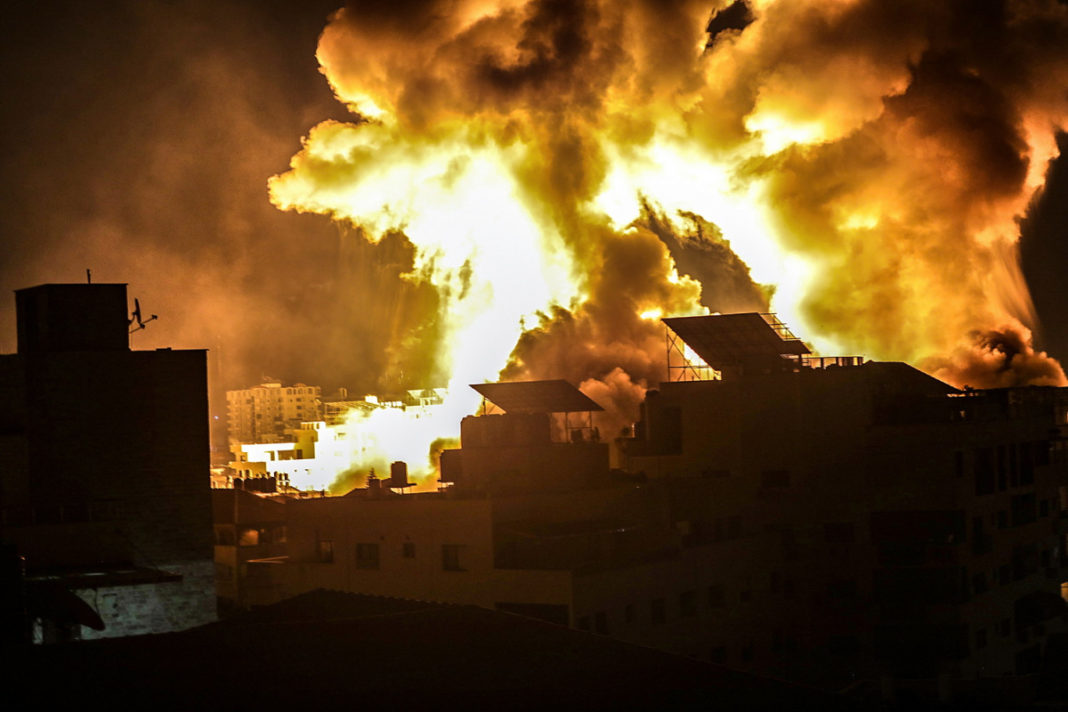With the Gaza Strip turned into a dungeon hell, international diplomatic efforts to resolve the crisis are intensifying.
New international diplomatic initiatives are expected today, Tuesday, May 18, to stop the Israeli army bombing of the Gaza Strip and the response of rocket-propelled grenades by Palestinian armed groups against Israeli cities that have been going on for weeks.
At least 221 people, most of them Palestinians, have been killed since a new round of violence broke out between Israel and Palestinian groups in the Hamas-controlled Palestinian enclave last Monday.
The UN Security Council is expected to meet again today for the fourth time in a row behind closed doors as the United States continues to refuse to vote in favor of a joint statement calling on the warring parties to ” end the violence “.
US President Joe Biden, who has been accused by several Democrats of not being as strict as he should be towards Israel, yesterday called for a “ceasefire” in a new telephone conversation with Israeli Prime Minister Benjamin Netanyahu.
However, the protagonists of the crisis continue to be deaf to appeals. The “line” of the Israeli government is to “continue” the blows to the “terrorists”, Mr. Netanyahu said yesterday.
Shortly after midnight on Monday, Israeli Air Force fighter jets fired rockets at buildings in the Gaza Strip with repeated explosions illuminating the sky of the coastal enclave, French Prague reporters reported.
The previous bombings affected the offices of the Qatari Red Crescent in Gaza, as well as the only clinic that tested the new coronavirus in the impoverished Palestinian enclave, which has been under siege by Israel for almost 15 years.
” We can do nothing but stay at home, death can come at any time, ” said Gaza resident Ruba Abu al-Awf. ” The bombings are nonsense, they are carried out indiscriminately .”
Israeli missiles have opened craters on roads and have also caused extensive damage to the power grid, plunging the Gaza Strip into darkness almost entirely.
Some 40,000 Palestinians have been displaced and 2,500 have lost their homes as a result of the bombings.
Threats from Hamas
The Islamist movement Hamas has threatened to launch more rockets at Tel Aviv if the Israeli Air Force does not “stop targeting civilians”. It launches dozens of rockets against poles in southern Israel.
The Israeli military says it is bombing what it calls the “subway” of Palestinian militants, underground tunnels that allow the Hamas military arm to move ammunition and weapons, and houses of Hamas officials that it says are being used ” to store weapons .”
As many as 212 Palestinians have been killed in the Gaza Strip since the start of hostilities last Monday (May 10th), including at least 61 children, and more than 1,400 have been injured, according to the Gaza Ministry of Health. On the Israeli side, 10 people have been killed, including a child, and another 294 have been injured by rockets.
On another front, other rockets were fired from southern Lebanon at northern Israel but fell outside Israeli territory, the army said, adding that it opened fire in retaliation for “the point from which they were fired .”
Fighting has spread to the West Bank, where clashes between the Israeli army and Palestinians have killed 20 people in a week, according to the Palestinian side’s latest report.
Fatah called for a ” day of rage ” and declared a general strike today, calling for mobilizations in predominantly Arab and “mixed” cities in Israel, where tensions continue.
Abbas called for US intervention
In the West Bank, a Palestinian territory occupied by Israel since 1967, Palestinian Authority President Mahmoud Abbas called on US envoy Hadid Amr to “intervene” in Washington.
White House spokeswoman Jen Psaki yesterday defended a “discreet” but “intensive” US diplomatic approach to the issue.
The presidents of France, Emanuel Macron, and Egypt, Abdel Fattah al-Sisi, are working to mediate a ceasefire and are counting on Jordan’s support. Theoretically, another channel of contact remains open, through the UN, with the contribution of Qatar and Egypt.
A debate on the conflict, the deadliest since the summer of 2014, is expected to take place in Brussels during an extraordinary Foreign Affairs Council that is expected to take place – digitally – during the day.



